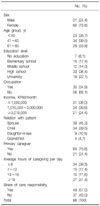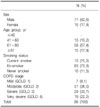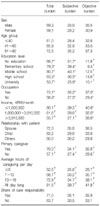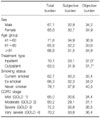Abstract
Background
Chronic obstructive pulmonary disease (COPD) is a major health problem resulting in significant burden for patients and families. However, family caregivers' burden has not been well recognized. The objectives of this study were to evaluate the level of caregivers' burden and to explore the related factors based on family, patient, and social support factors.
Methods
A face-to-face interview with 86 family caregivers who had been taking care of COPD patients was conducted. The participants answered a self-administered questionnaire. The questionnaire included the level of family caregivers' burden, health status and the relationship within the family, functional limitation of patients perceived by family caregivers and the social support.
Results
The level of caregivers' burden among participants was considerably high. Risk factors for caregivers' burden included low educational level of family caregivers, low family income, hours of caregiving, and functional limitation of the patients. Protective factors for caregivers' burden were good relationship within the family and support from other family members or friends.
Conclusion
It is proved that family caregivers are facing significant burden in taking care of COPD patients. To reduce family caregivers' burden, it is necessary to address socioeconomic status of the family and to provide various community resources including financial support and nursing services.
Figures and Tables
Table 3
Data of family health stage, family relationship, patient functional limitation and social support

References
1. Murray CJ, Lopez AD. Alternative projections of mortality and disability by cause 1990-2020: global burden of disease study. Lancet. 1997. 349:1498–1504.
2. Mannino DM, Buist AS. Global burden of COPD: risk factors, prevalence, and future trends. Lancet. 2007. 370:765–773.
3. Fehrenbach C. NICE guidelines for chronic obstructive pulmonary disease--a review. Nurs Times. 2004. 100:48–51.
4. Midgley C. Chronic obstructive pulmonary disease: a forgotten killer. 2008. 1st ed. Oxford: Oxford University Press.
5. Washio M, Inoue H, Kiyohara C, Matsumoto K, Nakanishi Y, Arai Y, et al. Depression among caregivers of patients with chronic obstructive pulmonary disease. Int Med J. 2003. 10:255–259.
6. Takata S, Washio M, Moriwaki A, Tsuda T, Nakayama H, Iwanaga T, et al. Burden among caregivers of patients with chronic obstructive pulmonary disease with long-term oxygen therapy. Int Med J. 2008. 15:53–57.
7. Bergs D. The hidden client-women caring for husbands with COPD: their experience of quality of life. J Clin Nurs. 2002. 11:613–621.
8. Suh MH, Oh KS. A Study of well-being in caregivers caring for chronically ill family members. J Nurs Acad Soc. 1993. 23:467–486.
9. Kim EK, Lee EJ, Sohn J, Lee BC. Family caregiver burden of stroke patient. J Korean Geriatr Soc. 2003. 7:101–124.
10. Rhee KO, Lee MJ. A study on caregiving burden among family caregivers of impaired elderly. J Korea Gerontol Soc. 2000. 20:215–228.
11. Oh KO, Hong CS. The burden and mental health of family caregiver with chronic mentally ill patients in community. J Korean Acad Psychiatr Ment Health Nurs. 2000. 9:499–513.
12. Zarit SH, Orr NK, Zarit JM. Families under stress: caring for the patients with Alzheimer's Disease and other related disorders. 1985. 1st ed. New York: University Press.
13. Novak M, Guest C. Application of a multidimensional caregiver burden inventory. Gerontologist. 1989. 29:798–803.
14. Brodman K, Erdmann AJ Jr, Lorge I, Wolfe HG, Broadbent TH. The Cornell medical index-health questionnaire. II. As a diagnostic instrument. J Am Med Assoc. 1951. 145:152–157.
15. Moos RH, Moos BS. Family environment scale manual. 1994. 3rd ed. Palo Alto, CA: Consulting Psychologists.
16. Stewart AL, Ware JE, Brook RH. Conceptualization and measurement of health for adults in the health insurance study: physical health in terms of functioning. 1978. 1st ed. Santa Monica, CA: RAND Corporation.
17. Park SJ. Symptom experience and quality of life in patients with chronic lung disease: with a special reference to bronchial asthma and bronchiectasis. J Korean Acad Adult Nurs. 2002. 14:470–478.
18. Park SY, O WH, Jang HJ, Lim JW, Jo JH. A study on the family caregiver's burden of burn patients. J Korean Burn Soc. 2001. 4:91–108.
19. Yang S, Jang MH. Awareness of need and degree of participation for the role of family members as psychiatric patients treatment partners, and the burden in chronic mentally ill patients family. J Korean Acad Psychiatr Ment Health Nurs. 2000. 9:94–111.
20. Wachtel MS. Family poverty accounts for differences in lower-extremity amputation rates of minorities 50 years old or more with diabetes. J Natl Med Assoc. 2005. 97:334–338.
21. House JS. Understanding social factors and inequalities in health: 20th century progress and 21st century prospects. J Health Soc Behav. 2002. 43:125–142.
22. Clipp EC, George LK. Caregiver needs and patterns of social support. J Gerontol. 1990. 45:S102–S111.
23. Bulger MW, Wandersman A, Goldman CR. Burdens and gratifications of caregiving: appraisal of parental care of adults with schizophrenia. Am J Orthopsychiatry. 1993. 63:255–265.
24. Kim CK, Kim JW, Seo JM, Lee GZ, Kim GJ, Byun WT. Family burden of schizophrenics in the primary caregivers and siblings. J Korean Neuropsychiatr Assoc. 2000. 39:113–127.
25. Zarit SH, Todd PA, Zarit JM. Subjective burden of husbands and wives as caregivers: a longitudinal study. Gerontologist. 1986. 26:260–266.
26. Lazarus RS, Folkman S. Stress, appraisal, and coping. 1984. 1st ed. New York: Springer.
27. Arai Y, Washio M. Burden felt by family caring for the elderly members needing care in southern Japan. Aging Ment Health. 1999. 3:158–164.




 PDF
PDF ePub
ePub Citation
Citation Print
Print









 XML Download
XML Download